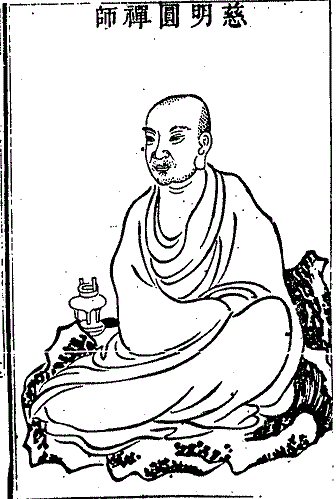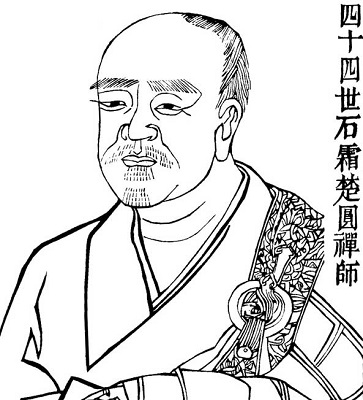ZEN IRODALOM ZEN LITERATURE
« Zen főoldal
« vissza a Terebess Online nyitólapjára

石霜/慈明 楚圓 Shishuang/Ciming Chuyuan (986–1039)
(Rōmaji:) Sekisō/Jimei Soen
Shishuang Chuyuan, "Zhiming"
by Andy Ferguson
In: Zen's Chinese Heritage: The Masters and Their Teachings, Wisdom Publications, 2011, pp. 379-382.

SHISHUANG CHUYUAN (986–1039) was a disciple of Fenyang Shanzhao, the famous literary Zen master of the Linji lineage. Shishuang came from the city of Qingxiang in Chuanzhou (located in modern Guangxi Province). He left home at the age of twenty-two, and was ordained at Yinjing Temple.
Later, he traveled to Luoyang City with his companions Dayu Shouzhi and Guquan. Hearing that Fenyang Shanzhao had an unsurpassed Zen style, the group proceeded to Fenzhou to study with that master. Two years of severe frustration followed, as Fenyang would not even allow Shishuang into his room for an interview. On each occasion that Shishuang met his teacher he was subjected to a scolding. Fenyang seemed to hurl abuse everywhere, and his training appeared to Shishuang to be little more than a stream of vulgarity.
Making no apparent progress, Shishuang finally poured out his frustration to Fenyang.
“I’ve been here for two years and you haven’t given me any instruction! You’ve just increased the world’s vulgarity, dust, and toil, while the years and months fly away. Even what I knew before is no longer clear, and I’ve lost whatever good came from leaving home.”
But before Shishuang could finish speaking, Fenyang glared at him fiercely and cursed him, saying: “What you know is vile! How dare you sell me short!” So saying, Fenyang picked up his staff to drive Shishuang away. Shishuang tried to plead with him, but Fenyang covered Shishuang’s mouth with his hand. At that moment, Shishuang realized great enlightenment.
He then exclaimed, “It’s knowing the extraordinary emotion of Linji’s way!”
*
After this event, Shishuang remained as Fenyang’s attendant for seven years. Shishuang taught in and around ancient Tanzhou. He gained his mountain name at Shishuang Temple, the temple founded earlier by Zen master Shishuang Qingzhu.
*
Shishuang entered the hall and addressed the monks, saying, “All of the buddhas, and all of the buddhas’ anuttara-samyaksambodhi, come forth from this sutra.” He then raised his staff upright and said, “This is the Nanyuan Temple staff. Where is the sutra?”
After a long pause he said, “The text is long. I’ll give it to you later.”
Then, with a shout, he got down from the seat.
*
Shishuang entered the hall and said, “If a teacher of our school can snatch a jewel off of the clothes of an impoverished man, then he can be said to have reached the stage of ‘person.’ If not, then he’s a mud and water fellow.”
After a pause, Shishuang said, “If you meet a swordsman on the road, show him the jeweled sword. If he’s not a poet, don’t offer him a poem.”
Shishuang shouted.
*
Shishuang entered the hall and said, “I have a word that cuts off thinking and leaves cause and effect behind. But even clever people can’t speak it! It may only be transmitted by way of mind. There is another word that may only be directly expressed. What is the word that can only be directly expressed?”
After a pause, Shishuang drew a circle in the air with his staff. Then he shouted.
*
A monk said, “I’m confused. What should I study?”
Shishuang said, “Xuansha saw Xuefeng arrive.”
The monk said, “What does that mean?”
Shishuang said, “In an entire lifetime, never leaving the mountain.”
*
Shishuang addressed the monks, saying, “The more medicine that is used, the worse the disease becomes. The finer the fishing net mesh, the more fish that escape.”
Shishuang then left the hall.
*
A monk asked, “When someone goes on a pilgrimage but doesn’t meet a teacher with whom he finds affinity, then what?”
Shishuang said, “The fishing line twists in the water.”
*
A monk asked, “I don’t ask about the leaves picked off the branches. What is the actual root?”
Shishuang said, “A willow-wood staff.”
The monk said, “What does that mean?”
Shishuang said, “When a monk goes traveling he carries his clothes with it on his shoulders. When he sits, he holds it in his hand.”
*
Shishuang entered the hall and said, “Those persons of nonaction with nothing to do—they still have the problem of the golden lock.”
Then, with a shout, he got down from the seat.
*
Case 46 of the Gateless Gate features a famous kōan posed by Shishuang.
*
Master Shishuang said, “How does one step forward from the top of a hundred-foot pole? An ancient worthy said, ‘Although a person sitting atop a hundred-foot pole has gained entry, he has still not reached the truth. From the top of a hundred-foot pole, he must step into the complete universal body in the ten directions.’”
*
Shishuang received honors from Emperor Ren Zong, and during the return trip to his temple he said to his attendant, “I feel a paralyzing wind.”
Shishuang’s mouth became crooked.
His attendant stopped and said, “What should we do? You’ve spent your whole life cursing the buddhas and reviling the ancestors. So now what can you do?”
Shishuang said, “Don’t worry. I’ll straighten it for you.”
He then used his hand to straighten his mouth.
Then Shishuang said, “From now on I won’t play any more jokes on you.”
The next year, on the fifth day of the first month, the master passed away.
*
During a relatively short life, Shishuang taught at several different temples and is said to have had fifty Dharma heirs. His famous students, Yangqi Fanghui and Huanglong Huinan, each established distinctive branches of the Linji Zen line. Besides teaching at Chongsheng Temple on Mt. Shishuang, he is known to have taught at the famous Zen mountains Dong Shan, Gui Shan, and Heng Shan. He received the posthumous name “Zen Master Compassionate Clarity.”
Shishuang/Ciming Chuyuan's Dharma Lineage
[...]
菩提達磨 Bodhidharma, Putidamo (Bodaidaruma ?-532/5)
大祖慧可 Dazu Huike (Taiso Eka 487-593)
鑑智僧璨 Jianzhi Sengcan (Kanchi Sōsan ?-606)
大毉道信 Dayi Daoxin (Daii Dōshin 580-651)
大滿弘忍 Daman Hongren (Daiman Kōnin 601-674)
大鑑慧能 Dajian Huineng (Daikan Enō 638-713)
南嶽懷讓 Nanyue Huairang (Nangaku Ejō 677-744)
馬祖道一 Mazu Daoyi (Baso Dōitsu 709-788)
百丈懷海 Baizhang Huaihai (Hyakujō Ekai 750-814)
黃蘗希運 Huangbo Xiyun (Ōbaku Kiun ?-850)
臨濟義玄 Linji Yixuan (Rinzai Gigen ?-866)
興化存獎 Xinghua Cunjiang (Kōke Zonshō 830-888)
南院慧顒 Nanyuan Huiyong (Nan'in Egyō ?-952)
風穴延沼 Fengxue Yanzhao (Fuketsu Enshō 896-973)
首山省念 Shoushan Shengnian (Shuzan Shōnen 926-993)
汾陽善昭 Fenyang Shanzhao (Fun'yo Zenshō 947-1024)
石霜/慈明 楚圓 Shishuang/Ciming Chuyuan (Sekisō/Jimei Soen 986-1039)
*